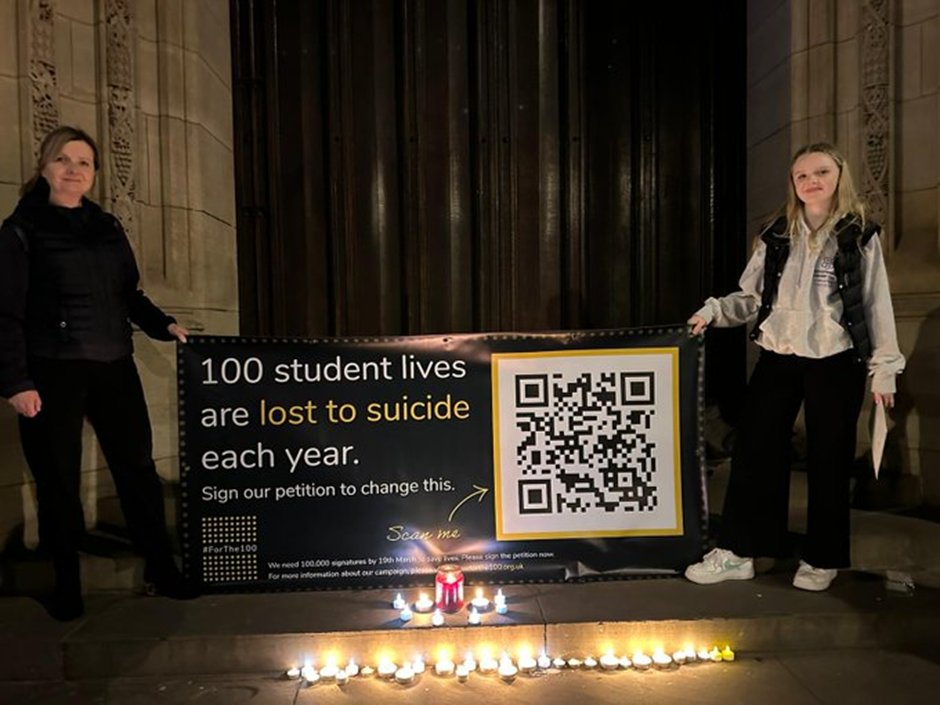Next month, the legal duty of care for university students will be debated in parliament after a campaign was launched in September of last year.
The petition, which was brought by the #ForThe100 campaign group and received over 120,000 signatures, is aimed at improving mental health services in universities, in a bid to reduce the number of students taking their own lives, by calling for a statutory duty of care for students to be imposed.
At the moment, there is duty of care legislation in place for university staff as well as students under the age of 18.
ONS data revealed 64 university students took their own lives in the academic year ending 2020 in England and Wales. The campaign group believes this figure to be around 100.
Mike McCarthy, who helped create the suicide prevention charity, Baton of Hope, said: “If you’re under 35, man or woman, the biggest threat to your life is you. Not covid, cancer, drugs, road accidents, it’s you.”
While the aims of the petition are broadly agreed upon, there are concerns over privacy, funding and accountability with lecturers and university standards groups expressing their concerns about how this might be achieved.
What duties do universities have?
Currently, there is no legislative framework for universities and their duty of care toward their students. However, recommendations regarding a university’s approach to mental well-being and suicide have been made by Universities UK.
Professor Steve West CBE, President of Universities UK and Vice-Chancellor of UWE Bristol believes a statutory duty of care is not the correct approach to drive change and help in prevention and early intervention.
He said: “We do not believe the proposed additional statutory duty of care, beyond the existing duties that already apply to universities, would be practical, proportionate, or the best approach to supporting students.”
Sceptics of the legislative approach argue universities already provide mental well-being resources.
A spokesperson for the Department of Education, said: “We expect all universities to take active steps to prevent suicides and support students’ mental health.
“Every student death is a tragedy and we recognise that there are those with personal experience of these tragic events who have signed this petition, which will now be considered for debate in Parliament.”
A key point of contention between advocates and those expressing concerns about the proposed legislation is the belief that there already is an existing expectation of care, despite no legal mandate.
Georgina Calvert-Lee, a senior consultant and barrister at Bellevue Law, said: “Universities’ response is that they already do this, they don’t need to be mandated — but then why do they care if it’s a requirement, if they’re already complying?”
The legislation put forward by the petition already has support in Parliament from members who acknowledge the lack of a legal framework.
Tom Gordon, the Liberal Democrat Parliamentary Spokesperson for Harrogate and Knaresborough, said: “There is currently a lack of legal protections for students who don’t benefit from the Equality Act and it is right that this should be changed.”
Some advocates are pushing for more, though, claiming current services are not robust enough.
Mr McCarthy said: “The very clear picture that we get is that the support for students in terms of mental health provision and suicide prevention is inadequate — there’s no way to dress this up.”
The implications and concerns surrounding it
One of the biggest concerns surrounding the implementation of a duty of care legal mandate is accountability. Universities fear this might create an avenue to unjustly punish, not only institutions but also individual staff.

Dr Mark Shanahan is a politics lecturer who has been advocating for duty of care in higher education since his son, Rory, took his own life in 2018 when he was studying at the University of Sheffield. He believes fears around accountability on individual staff are misplaced and a duty of care would actually create a legal avenue to hold those who have failed to fulfil their role.
He said: “There is an unfounded fear that universities will be sued when things go wrong. In my son’s case, there was a systemic failure, not a failure of individuals, and we think this will usually be the case.”
Ms Calvert-Lee agrees and believes the legislation the petition demands would, in fact, present an opportunity for universities to invest and “reorganise their processes and hire whatever staff they need”.
However, those concerned about the petition don’t believe this will actually happen through a legislative mandate.
A spokesperson for AMOSSHE, a student services organisation which will be attending the Committee Petition evidence session on May 16, said: “It is our view that increased funding for student mental health services in the NHS is a greater priority than an additional duty of care on universities.”
Instead, critics of the petition believe the proposals will not result in more mental health professionals being hired, but rather a heavier burden on existing staff.
Rachel Moss, a senior history lecturer at the University of Northampton, took to Twitter to voice her concerns.
The one point critics and supporters of the campaign agree on is more funding is needed, to acknowledge the pressures higher education staff are already under.
Mr McCarthy said: “If universities say they’re struggling then we must take that on board. We have to listen to what they are saying, and we have to respond accordingly.”
Another concern surrounds privacy and the way mental well-being problems are communicated to the families of those who are struggling.
Mental health practitioners are often reluctant to share sensitive and private information when university students are over the age of 18.
It is accepted professionals are not refusing to share information regardless of the situation, what advocates are calling for is a lower threshold to retain such information.
Mr McCarthy said: “I don’t think it’s as complicated as some people make out — I think where life is at risk, then we look at the next of kin.
“It’s too late when somebody has died to say that at least they have a right to privacy.”
Practically, there are also concerns over the way statistical information is treated in the case of student suicides as universities are not required to hold this kind of information on student suicide.
In a sister petition to the #ForThe100, which never gained the required 100,000 signatures for it to be debated in parliament, advocates of “Harry’s Law” have called for the introduction of new rules which would see coroners informing universities when a case of suicide is recorded and publish the data annually. The petition was created after Harry Armstrong Evans, a 21-year-old from the University of Exeter took his own life.
This point could be discussed at the parliamentary debate next month, but concerns have been raised regarding the significance of such data. More specifically, due to the number of suicides being statistically low, especially when it comes to individual universities, a yearly comparison would be hard to measure.
Advocates have pointed out, though, there would be other ways of measuring the success of duty of care.
The Higher Education Policy Institute (HEPI), for instance, suggests success could be easily measured through data which reveals fewer overall students requiring support.
The stigma around mental health and suicide
Although the approach to how suicide should be handled by universities is debated, both advocates and sceptics of the petition agree that it is important to mitigate the stigma around suicide and promote dialogue.
Lisa Ravenscroft, the communications manager at ProtectED, a Code of Practice and accreditation scheme organisation for university standards, said: “We want students to declare if they do have mental health issues because then the university can be prepared and get everything in place.
“We know that a lot of students don’t, because they’re worried there’s a stigma and people aren’t going to understand.”




